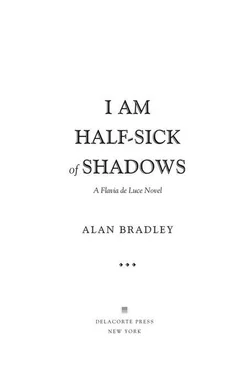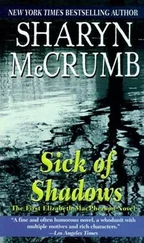Alan Bradley - I Am Half-Sick of Shadows
Здесь есть возможность читать онлайн «Alan Bradley - I Am Half-Sick of Shadows» весь текст электронной книги совершенно бесплатно (целиком полную версию без сокращений). В некоторых случаях можно слушать аудио, скачать через торрент в формате fb2 и присутствует краткое содержание. Жанр: Старинная литература, на английском языке. Описание произведения, (предисловие) а так же отзывы посетителей доступны на портале библиотеки ЛибКат.
- Название:I Am Half-Sick of Shadows
- Автор:
- Жанр:
- Год:неизвестен
- ISBN:нет данных
- Рейтинг книги:5 / 5. Голосов: 1
-
Избранное:Добавить в избранное
- Отзывы:
-
Ваша оценка:
- 100
- 1
- 2
- 3
- 4
- 5
I Am Half-Sick of Shadows: краткое содержание, описание и аннотация
Предлагаем к чтению аннотацию, описание, краткое содержание или предисловие (зависит от того, что написал сам автор книги «I Am Half-Sick of Shadows»). Если вы не нашли необходимую информацию о книге — напишите в комментариях, мы постараемся отыскать её.
I Am Half-Sick of Shadows — читать онлайн бесплатно полную книгу (весь текст) целиком
Ниже представлен текст книги, разбитый по страницам. Система сохранения места последней прочитанной страницы, позволяет с удобством читать онлайн бесплатно книгу «I Am Half-Sick of Shadows», без необходимости каждый раз заново искать на чём Вы остановились. Поставьте закладку, и сможете в любой момент перейти на страницу, на которой закончили чтение.
Интервал:
Закладка:
Slowly, I descended the staircase, taking special care to tiptoe past the sleeping Dieter.
Over there, against the wall, was Cynthia Richardson, in sleep as relaxed as an archangel on a Christmas card; her face like Flora in the Botticelli painting. I wished I’d had a camera so that I could preserve that unexpected glimpse of her forever.
At her side the vicar slept, his brow deeply furrowed.
“Hannah, please! No!” he whispered, and for a moment, I thought that he had awakened.
Who was Hannah, I wondered, and why was she tormenting him in his sleep?
Upstairs, a door closed softly.
Phyllis Wyvern , I thought. She’s finished for the night with her viewing .
A marvelous idea floated into my mind.
Why not see if she wanted to talk? Perhaps, like me, she was sleepless.
Or what if she was lonely? We could have a nice chat about grisly murders. Being so famous probably meant that all her friends were in it for the money—or the glory: for being able to say they were chummy with Phyllis Wyvern.
She’d have no one to talk to about the things that really counted.
Besides, it would probably be a once-in-a-lifetime opportunity to have a world-famous movie star all to myself—even if only for a few minutes.
But wait! What if she was tired? What if she still hadn’t got over that fierce outburst when she’d slapped Gil Crawford’s face? Would she do the same to me? I could almost feel the sting of her hand on my cheek.
Still, if I told Feely I’d spent an hour or so idly chitchatting with Phyllis Wyvern, she’d be sick jealous!
That settled it.
From the bottom of the stairs, I set out on tiptoe across the foyer, picking a precarious and winding path between the sleeping bodies.
While I was still in the midst of the encampment and halfway to the west staircase, a water closet flushed.
I froze.
It was an unpleasant fact of life at Buckshaw that the rickety maze of pipes that passed for plumbing had seen far, far better days. They were, in fact, past their prime when Queen Victoria was on the throne, if one may be permitted to say such a thing.
A flush here or a water faucet activated there transmitted vast shudders and groans to the farthest corners of the house like some bizarre hydraulic signaling system from another age.
To put it plainly, no one at Buckshaw had any secrets—not, at least, in the plumbing department.
I stopped breathing until the shudder of pipes subsided in a far distant clatter. Ned, who was propped up against a wall with his feet splayed out like a cast-off doll, gave a groan, and Mary, whose head was on his knees, turned over in her sleep.
I counted to a hundred, just to be sure, and again began picking my way between the sleeping bodies.
Up the west staircase I went, one step at a time, counting them as I climbed: ten to the landing, another ten to the top corridor.
I knew that the thirteenth tread from the bottom groaned alarmingly, and I took a giant step to climb over it in silence, hauling myself up by gripping the banister.
Past the top of the stairs, the corridor was in darkness, and I had to feel my way along by sense of touch. The baize door to the north front swung open without a sound.
This was the part of the house that had been assigned as billets, the dusty sheets that usually covered the furniture having been removed, and the multitude of bedrooms made ready for the visiting film crew.
I had no idea which bedroom had ultimately been allocated to Phyllis Wyvern, but common sense told me that it would have been the largest: the Blue Bedroom—the one usually occupied by Aunt Felicity on her ceremonial visits.
A crack of light at the bottom of the door told me that I was right.
Inside, something mechanical was running: a whirring, a whine, hardly louder than a whisper.
Slap! Slap! Slap! Slap! Slap!
What on earth could it be?
I tapped lightly on the door with one of my fingernails.
There was no reply.
Inside the room, the noise went on.
Slap! Slap! Slap! Slap! Slap!
Perhaps she hadn’t heard me.
I knocked again, this time with my knuckles.
“Miss Wyvern,” I whispered at the door. “Are you awake? It’s me, Flavia.”
Still no response.
I knelt down and tried to peer through the keyhole, but something was blocking my view. Almost certainly the key.
As I got to my feet, I stumbled in the darkness and fell against the door, which, in awful silence, swung inward.
On the far side of the room stood the great canopied bed, made up and turned down, but unoccupied.
To the left, on a tubular stand in the shadows, a ciné projector ground on and on, its steady white beam illuminating the surface of a tripod screen on the far side of the room.
Although the film had run completely through the machine, its loose end, like a black bullwhip, was still flapping round and round: Slap! Slap! Slap! Slap! Slap!
Phyllis Wyvern was slumped in a wing-back chair, her sightless eyes staring intently at the glare of the blank screen.
Around her throat, like a necklace of death, was a length of ciné film, tied tightly, but neatly, in an elaborate black bow.
She was dead, of course.
• TWELVE •
IN MY ELEVEN YEARS of life I’ve seen a number of corpses. Each of them was interesting in a different way, and this one was no exception.
Because the others had been men, Phyllis Wyvern was the first dead female I had ever seen and as such, she was, I thought, deserving of particular attention.
I noticed at once the way the illuminated ciné screen was reflected in her eyeballs, giving the illusion for a moment that she was still alive, her eyes sparkling. But even though the eyes had not yet begun to cloud over— she’s not been dead for long , I thought—something had already begun to soften her features, as if her face were being sanded down for repainting.
The skin was already on its way to taking on the color of putty, and there was a very faint but distinct leaden tinge to the inside of her lips, which were open slightly, revealing the tips of her perfect teeth. A few drops of foamy saliva were trapped in each corner of her mouth.
She was no longer wearing her Juliet costume, but was dressed rather in an elaborately stitched Eastern European peasant blouse with a shawl and a voluminous skirt.
“Miss Wyvern,” I whispered, even though I knew it was pointless.
Still, there’s always that feeling that a dead person is playing a practical joke, and is going to leap up at any moment and shout “Boo!” and frighten you out of your wits, and my nerves, although strong, are not quite ready for that.
From what I had read and heard, I knew that in cases of sudden death, the authorities, either police or medical, were to be summoned at once. Cynthia Richardson had reported that the telephone was out of order, so the police, at least for the time being, were out of the picture, and Dr. Darby was in a deep sleep downstairs; I had seen him during my passage across the foyer.
There was no question that Phyllis Wyvern was past medical help, so my decision was an easy one: I would call Dogger.
Closing the bedroom door quietly behind me, I retraced my steps through the house—on tiptoe across the foyer once again—to Dogger’s little room at the top of the kitchen stairs.
I gave three quick taps at the door, and then a pause … two more taps … another pause … and then two slow ones.
I had scarcely finished when the door swung open on silent hinges, and Dogger stood there in his dressing gown.
“Are you all right?” I asked.
“Quite all right,” Dogger said after a barely perceptible pause. “Thank you for asking.”
Читать дальшеИнтервал:
Закладка:
Похожие книги на «I Am Half-Sick of Shadows»
Представляем Вашему вниманию похожие книги на «I Am Half-Sick of Shadows» списком для выбора. Мы отобрали схожую по названию и смыслу литературу в надежде предоставить читателям больше вариантов отыскать новые, интересные, ещё непрочитанные произведения.
Обсуждение, отзывы о книге «I Am Half-Sick of Shadows» и просто собственные мнения читателей. Оставьте ваши комментарии, напишите, что Вы думаете о произведении, его смысле или главных героях. Укажите что конкретно понравилось, а что нет, и почему Вы так считаете.











